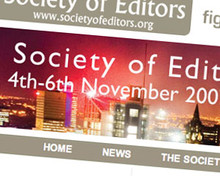
Responding to a question from the floor during a Q&A session, which asked for views on Google, given that its a trusted brand for news even though it doesn't produce any, Anne Spackman told delegates that Google was the number one topic of conversation at News Corp.
"We absolutely can't afford not to be brilliant on Google News. I think Google is hugely dangerous.
"Its move into DNA is a massive threat. I wonder whether we will all start feeling that they are behaving a little bit too much like big brother," she said.
"The number one topic of conversation at News Corp is Google."
In an earlier speech she said Google was the biggest influence on the news business and added that newspapers should not hold back the pace of change online.
"Digital evolves extremely fast, it wasn't that long ago that our websites represented our newspapers on the computer screen," she said.
"They are nothing like that now, and that pace of change has to be allowed to go along very, very fast.
"We have to be careful that in our rush to integrate, which is driven as much by business reasons as by reasons of journalism, that we don't hold back the pace of change."
Consumer behaviour, she added, will lead to news websites being viewed away from computers on an increasing number of devices with smaller and smaller screens.
This coupled with developments in iPod technology and constant changes to Google algorithms means, she added, that her publication has to be able react quickly to changes.
National newspapers online, she added, were in competition with roughly 1,500 other English language websites across the globe, and they would have to work hard on differentiating themselves from the competition.
She added that regional newspapers had an advantage in this area, because of the geographical distinction to their audience.
"[online] is a high risk business, it's fast changing. It's very different from that loyal audience that we have on the newspapers. To be honest it's like operating in the Wild West."�
Free daily newsletter
If you like our news and feature articles, you can sign up to receive our free daily (Mon-Fri) email newsletter (mobile friendly).
Related articles
- Revenue and tech: Five must-read news reports for your newsroom
- Media analyst Thomas Baekdal: 'News publishers must stop fighting for the scraps of ad revenue'
- Post-Perugia thoughts: what went wrong between big tech and the news?
- Audiences, AI and audio apps: five talking points from Perugia
- Protecting independent journalism, with Lexie Kirkconnell-Kawana of IMPRESS











